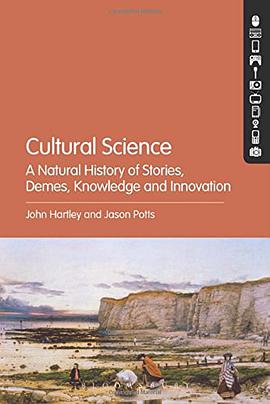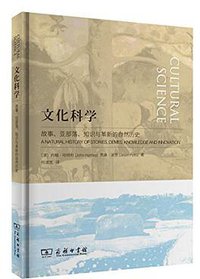Cultural Science
豆瓣
A Natural History of Stories, Demes, Knowledge and Innovation
John Hartley / Jason Potts
简介
Cultural Science introduces a new way of thinking about culture. Adopting an evolutionary and systems approach, the authors argue that culture is the population-wide source of newness and innovation; it faces the future, not the past. Its chief characteristic is the formation of groups or 'demes' (organised and productive subpopulation; 'demos'). Demes are the means for creating, distributing and growing knowledge. However, such groups are competitive and knowledge-systems are adversarial.
Starting from a rereading of Darwinian evolutionary theory, the book utilises multidisciplinary resources: Raymond Williams's 'culture is ordinary' approach; evolutionary science (e.g. Mark Pagel and Herbert Gintis); semiotics (Yuri Lotman); and economic theory (from Schumpeter to McCloskey).
Successive chapters argue that:
-Culture and knowledge need to be understood from an externalist ('linked brains') perspective, rather than through the lens of individual behaviour;
-Demes are created by culture, especially storytelling, which in turn constitutes both politics and economics;
-The clash of systems - including demes - is productive of newness, meaningfulness and successful reproduction of culture;
-Contemporary urban culture and citizenship can best be explained by investigating how culture is used, and how newness and innovation emerge from unstable and contested boundaries between different meaning systems;
-The evolution of culture is a process of technologically enabled 'demic concentration' of knowledge, across overlapping meaning-systems or semiospheres; a process where the number of demes accessible to any individual has increased at an accelerating rate, resulting in new problems of scale and coordination for cultural science to address.
The book argues for interdisciplinary 'consilience', linking evolutionary and complexity theory in the natural sciences, economics and anthropology in the social sciences, and cultural, communication and media studies in the humanities and creative arts. It describes what is needed for a new 'modern synthesis' for the cultural sciences. It combines analytical and historical methods, to provide a framework for a general reconceptualisation of the theory of culture - one that is focused not on its political or customary aspects but rather its evolutionary significance as a generator of newness and innovation.
contents
译者前言
作者中文版序:寻求文化与科学的通约性
绪论
第一章奇异的相似现象:文化的性质
第一节每个社群成员应如何行事
第二节自然进化与文化演化奇异的相似性
第三节受宠的语词:社会达尔文主义?
第四节本书作者的工具
第五节自然与文化对立?
第六节叩问悠悠地球
第一部文化造就群体
第二章外在论:身份(“我”即“我们”)
第一节自创生
第二节交流创生个体
第三节调和文化与知识:文化科学路径
第四节表意功能进化的逻辑展开:众智推荐的十大步骤
第五节联通的大脑和外化的知识
第三章亚部落:普遍—对立的群体属性(“我们”与“他们”)
第一节故事
第二节亚部落
第三节自我的创造
第四节加里波利登陆战:国民性的塑造
第五节爷爷辈——没有故事的故事……
第六节哥贝克力遗址——柴尔德和新石器革命
第七节《太阳报》?讲故事的大炮……哑炮了?
第八节数字故事建构新的社会组织
第四章“抛石机”:恶邻原理
第一节大合作——普遍的或对立的?
第二节大文化
第三节抛石机:恶邻
第四节系统暴力
第五节文化规模很大时,什么事情会发生呢?
第五章公民:亚部落的富集创造知识
第一节何谓公民?
第二节理性公民理论
第三节公民身份演化考
第四节创意公民身份
第五节“保健”模式对“欺骗”模式?
第六节艺术家、消费者和系统碰撞
第二部群体创造知识
第六章表意功能:知识的增长
第一节什么在进化?
第二节酷似知识的概念
第三节意义和语言、表意功能与文化
第四节知识进化
第五节绅士的文化演化(简短但给人教益的题外话)
第六节文化的性质与生物符号学的超越
第七节表意功能与适婚条件
第八节激烈争夺的文化秩序
第七章新颖思想:创新
第一节文化两面神
第二节文化变革的动态尺度
第三节随机性造成多样性
第四节意识造就创意
第五节亚部落创造新颖性
第六节创新的经济社会学:新颖会产生“恼人的冲击”
第八章浪费:再生产的成功
第一节论文化生产的效率
第二节数以兆计
第三节文化效率
第四节儿童与浪费
第五节白费的语词?
第六节儿童的文化发明
第九章湮灭:弹性与僵化
第一节趋社会性的结群动物,在冲突和衰减中磨砺
第二节如何保护珍贵遗产
第三节什么是文化湮灭?
第四节作为合作的征服
第五节规则与僵化
第六节大城市是符号指代的生成器
第七节复杂文化系统
第三部结语
第十章亚部落富集的自然历史
第一节文化在社会里的用途
第二节文化科学的诸多特殊意义
第三节亚部落富集的自然历史
第四节文化如何运行
谢辞
参考文献
译者后记
